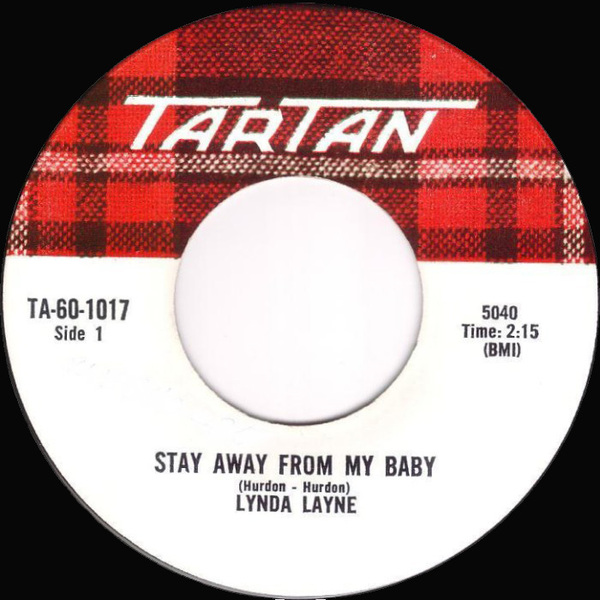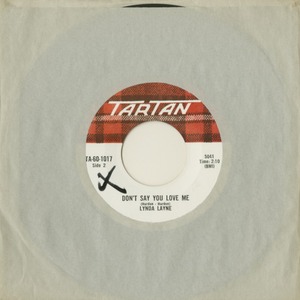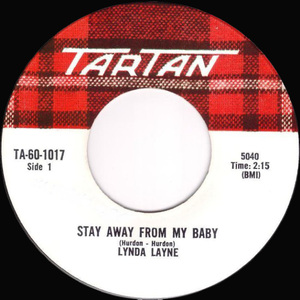Information/Write-up
“Stay Away From My Baby” marked the first official release under the name Lynda Layne, following Hazel McKirdy’s debut single earlier that year on Arc. Issued by Tartan Records in 1963, the track was co-written by Basil and Dyer Hurdon, the prolific songwriting duo behind many of Bobby Curtola’s biggest hits.
The single proved to be her breakout moment. According to chart historian Ray McGinnis, the song peaked at #6 in Halifax and entered the Top 30 in Ottawa, marking a regional hit that helped introduce her voice to Canadian airwaves. The release also charted modestly in the U.S., reportedly reaching #80 on the Billboard Hot 100【source: RayMcGinnisMusic.com, March 11, 2024】.
By the following year, Layne’s national presence had grown. She became a regular on CBC’s Music Hop and received critical industry recognition:
“LYNDA LAYNE – TARTAN RECORDS”
— RPM Weekly, Nov. 2, 1964 – “This Is Talent! Canada’s Rising Record Stars”
“MOST PROMISING FEMALE VOCALIST: Lynda Layne – Tartan Records”
— RPM Honor Roll, Dec. 28, 1964
“Lynda Layne has just been voted the most promising female singer in Canada... One of the changes we would like to see with this underexposed artist is a new look entirely.”
— RPM Weekly, Jan. 11, 1965
This single launched Lynda Layne’s national career, beginning a string of increasingly ambitious pop and soul recordings throughout the decade.
Born Hazel McKirdy in 1949 in Kitchener, Ontario, Lynda Layne emerged in the early 1960s as one of Canada’s most promising teen pop vocalists. At just 14 years old, she released her debut single in 1963 on Arc Records under her birth name—a cover of Skeeter Davis’s “End of the World” backed with “Mama Didn’t Lie.” These recordings, though modest in reach, hinted at a budding star with poise well beyond her years.
Soon adopting the stage name Lynda Layne, she quickly found her footing in the Canadian music scene through television. She became a regular on CBC’s Music Hop beginning in 1964 and appeared on programs like Juliette, Teen ’67, and CHCH-TV’s Jamboree. That same year, she was named “Most Promising Female Vocalist” by RPM Weekly—Canada’s premier music industry journal.
Her early recordings with labels like Tartan and RCA Victor International helped define her sound: bright, emotionally honest, and perfectly suited to the melodic contours of early-‘60s pop. As she matured, Layne took on more soulful and dramatic material, including the Tamarac-produced single “Hang On to Me Now Baby”, released in 1966 on Red Leaf Records. The track earned rave reviews from DJs and critics across the country and entered RPM’s national chart that December.
In 1967, Layne was once again recognized by RPM, winning “Most Promising Female Vocalist” a second time—outpacing other rising stars like Debbie Lori Kaye. She remained a fixture in the Canadian teen scene, touring with the Bigland Agency, performing at teen dances and exhibitions from Edmonton to the Maritimes, and receiving consistent airplay from stations like Toronto’s CKFH, which listed her among the core of their Canadian talent programming.
In 1969, she briefly teamed up with singer Larry Lee to record the quirky and theatrical duet “Most Peculiar Girl” b/w “Magnificent Out-Pouring”, issued by Nugget Records in Canada and later by Beacon Records in the UK. Though the collaboration was a one-off, it demonstrated Layne’s versatility and willingness to step outside of conventional pop formulas.
She returned in 1971 with a brassy, orchestrated version of the Rolling Stones’ “Out of Time,” released on Tuesday Records. The track stands as a bold reinterpretation—bringing a rich pop-soul sensibility to the Jagger-Richards original and further solidifying Layne’s vocal strength and stylistic range.
In 1979, Layne released one final single: “Love Is Suppose to Be” backed with “The Best I Can”, issued on Sound Path Records (SP-015). The single was produced at Zaza Sound in Toronto and was co-written by Nancy Ryan and Louie Innis.
After stepping away from music, she resumed life under her birth name and established a successful career in real estate in the Pickering–Ajax region of Ontario. Though she never released a full-length LP, her run of singles—from early teen ballads to soul-pop maturity—remains preserved through digitized archives and original 45s.
Today, Lynda Layne’s music can be heard and explored in depth at CitizenFreak.com, the Museum of Canadian Music, where her full catalog, scans, and credits are maintained. Her legacy is that of a trailblazer in Canadian pop—representing a generation of homegrown talent that flourished in the first great wave of national music broadcasting and teenage stardom.
-Robert Williston



No Comments